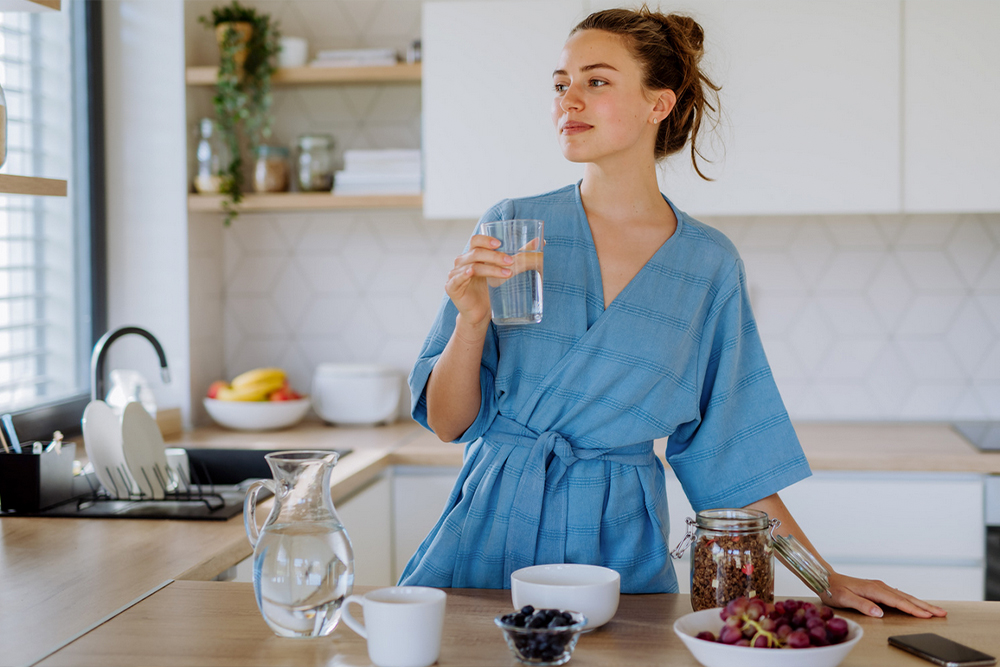
28 Dec Your guide to hydration
Water is the major constituent of the human body, with every significant system influenced by fluid balance. Water is responsible for clearing toxins, carrying nutrients to organs and cells, lubricating joints and bones and regulating our body temperature. Adequate water intake is essential to assist your body’s systems in functioning optimally. Over the past 40 years, however, humans have been dangerously misled by sports drink companies to believe that we need to drink ahead of thirst to be optimally hydrated. In fact, excess water consumption can have some serious adverse effects on physical and mental functioning. So we need to drink enough, but not too much…so how much should we drink?
Listen to your body
The human body is an incredibly impressive system and has pretty good ways of letting you know when something is not quite right. When it comes to hydration, your body indicates that it needs more water through the signal of thirst. When you lose water, your blood sodium concentrations increase. This is sensed by receptors in your brain, which produce hormonal changes that you feel through an increase in thirst. An increase in thirst generally leads to a behavioural change of you seeking out fluid to ingest. The ingestion of water reduces the blood sodium concentrations and, through the same pathway as before, reduces the sensation of thirst. Listen to your body; when you’re thirsty – drink water and when you’re not – stop drinking.
Follow the guidelines
It is recommended that women should consume 2l of water per day, and men 2.5l per day. Exact amounts are dependent on individual body weight and size and vary depending on activity levels and the temperature (heat) for the day. This equates to 8-10 glasses of water a day. Some useful tips to help you get your 8 glasses in.
- Invest in a reusable water bottle to carry with you and sip on throughout the day.
- Get into herbal tea. Herbal teas give your glass of water a delicious flavour without adding any extra sugary flavourings. In the winter months, it serves as a nice warm pick-me-up, and in summer, you can add some ice to make a refreshing iced tea.
- Drink a glass after every bathroom break. Link drinking water with one of your most common daily activities – going to the bathroom. Drinking a glass of water every time you get up to use the bathroom will get you into a habit in no time.
- Set a timer on your phone for every 3 hours and when it goes off consume a glass of water. There’s nothing like your alarm screaming at you to get you into a routine.
Enhance your hydration
While water is the fundamental ingredient for staying hydrated, certain supplements can significantly enhance the body’s ability to absorb and retain water, improving overall hydration. Here are some top picks:
- Magnesium: This essential mineral plays a crucial role in hydration. It aids in the movement of water into your cells and is vital for electrolyte balance. A deficiency in magnesium can lead to reduced hydration and electrolyte imbalances. Adding a magnesium supplement, especially if you’re active, can help maintain optimal hydration levels.
- Apple Cider Vinegar: Apple cider vinegar is known for its myriad health benefits, including its potential to assist in hydration. Its high mineral content can help balance your body’s natural electrolyte levels. A small amount added to water can enhance absorption and improve hydration, especially after exercise or in hot climates.
- Celtic Salt: Unlike regular table salt, Celtic salt contains a variety of minerals and trace elements. These minerals can help balance electrolytes in the body, enhancing water retention and absorption. A pinch of Celtic salt in your water not only adds flavor but can also aid in maintaining proper hydration.
- Quinton Electrolytes: Quinton electrolytes are a unique hydration supplement derived from seawater. They contain naturally occurring electrolytes and trace minerals in a form that is highly bioavailable. Adding these to your water can replenish the minerals lost through sweat and help maintain electrolyte balance, which is essential for optimal hydration.



No Comments